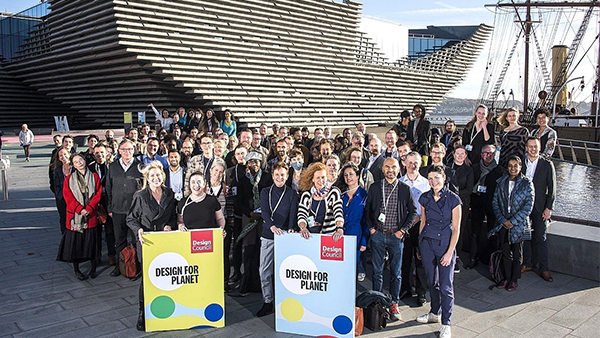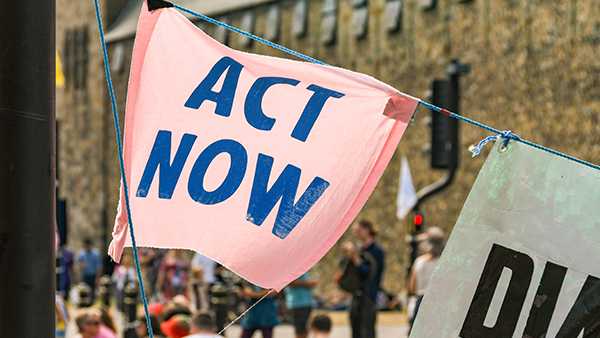Sarah Daly is a Sustainable Development Strategist working at government and regional level and striving to resolve issues around the housing crisis and the transition to modern methods of construction and offsite manufacture of homes
The latest reports show earth is hurtling towards climate disaster, with a global temperature rise skimming close to the 1.5% danger level that will trigger uncontrollable change. Despite the Paris Agreement, developed countries are still failing to decouple growth and emissions; the key barrier to change is that advanced economies are inextricably linked to capitalism – which literally fuels rising emissions.
So, I started to examine the key requirements of transition to resource-efficiency and to consider how ‘Brexiggedon’ could actually create a template for a more climate-friendly economy that is also more aligned with the SDGs and living within our carbon budget:
- Fewer food imports – this would encourage (or perhaps force) more local/seasonal produce: more allotments, vegetable patches and local orchards. Less meat with its destructive impacts like upland deforestation and carbon and water intensive methods, would reduce lowland flood risk; and the water and crop intensity of feeding less livestock would create a more balanced ability to grow the foods we need for a healthier, more plant-based diet. If imported alcohol is prohibitively expensive, maybe as a nation we will drink less and with a better diet, we will be the healthier for it, which will reduce diabetes, heart disease and cancer – the scourges of ‘developed’ countries. That will also reduce dependence on the NHS and the carbon-intensive pharmaceuticals sector that is itself, feeding off our nation’s unhealthy, ‘convenient’ choices.
- Loss of the automotive sector – we need to be massively less reliant on cars, both because of the embodied carbon of the sector and emissions in-use. Maybe if our automotive industry collapses and there are no cheap imports, households will review if they need two cars (or any cars) and increase use of walking, cycling, public transport and car-sharing schemes. With fewer cars, pollution levels will fall, our air will become cleaner and money will be saved on highways’ investment.
- Loss of freedom of movement – if air travel becomes prohibitively expensive and visas/queues make short-haul city breaks less attractive, then maybe we will save carbon by opting for staycations; and choose the Cornish Riviera over the Costa del Sol.
- More expensive consumer goods – if a No-Deal Brexit triggers a longer, deeper recession than the 2008 crash, as is predicted, perhaps we will look differently at what we ‘need’ and reject rampant consumerism. Perhaps we will learn to reuse, recycle, repurpose and favour community sharing/rental schemes in our new resource-constrained world driven by severely reduced disposable income. It may herald a different High Street, one where a range of community shops has a focus on reuse. What we used to call ‘antique’ shops will become more commonplace as we again value well-made pieces and shun the built-in obsolescence of pointless trends. Repair cafes would sit alongside artisan trades as the grocer, baker and candlestick maker have renewed importance and clothes return to their pre-industrialised purpose of warmth and modesty, rather than the shameful disposable fashion industry which now contributes around 10% of all emissions. Instead of dashing to the shops in a stressed frenzy, people would stop to talk and have time to connect. Depression, anxiety and loneliness would ebb away.
- Uncompetitive sectors – maybe as certain sectors move away or shrink (aerospace, automotive, financial services, pharmaceuticals) thousands of skilled people will view their prospects differently. Perhaps working long hours to buy more ‘stuff’ will be less appealing than self-sufficiency and quality time with family and friends. Perhaps they will turn their skills to the new emerging circular, sharing economy and set up community-based services like rental, swapping and bartering and live within a different perception of ‘means’, where social value is prized, and happiness is measured by having ‘enough’ not ‘more’.
- Loss of London as the world’s financial centre – there is no doubt Britain has become corrupted by its global fiscal role. Perhaps when London isn’t the centre of the financial world then the new socially-focussed government will see the centre of gravity move from the capital and the desperate regional wealth disparity and inequality will wain within a few years. The greedy top 5% of high net worth individuals, controlling 80% of the UK’s ‘paper wealth’ (which is actually underwritten by £1.8trillion of national debt) will move abroad, allowing a recalibration to create a naturally more balanced economy and fair society.
- Collapse of international trade – if we crash out of the EU, it would take years for our SME-dominated business community to find new customers and reach the level of profitable trading they enjoyed pre-Brexit. Most will go bankrupt before they can replace lost business in far flung places. So maybe those entrepreneurs can be encouraged into the circular economy where they focus on meeting local need. Currently 96% of UK-registered companies are micro-businesses with less than ten employees. The nation of shopkeepers will return to its roots.
- Energy crisis – if we lose the interconnectors and can import less power then we will be forced to become more energy-efficient. It is estimated 1/3rd of all UK energy requirements could be reduced with an energy-saving focus, yet free-flowing supplies merely encourage profligacy
If Britain truly wants to embrace its island-nation status then the rejection of globalisation and capitalism could be the prize of embracing an inward-facing, community-focused, self-sufficient model. If people don't care ‘at what cost' true sovereignty comes, then deconstructing capitalism is the purest form of ‘taking back control’ and future-proofing our home nations for the climate challenges ahead.
By default, Brexit Britain could become the sustainable exemplar for the developed world easily achieving a low-carbon, resilient economy by 2030.
Related articles
-
A design revolution for the climate emergency
Joanna Choukeir
Joanna Choukeir on Design for Planet, the global gathering of designers during COP26, and the changes design must make.
-
The public are ready to go further and faster on net zero
Anthony Painter
The public are ahead of policy-makers and, indeed, most of the business world. COP26 is an enormous opportunity to catch up. Global leaders should take it.
-
Everyday deliberation and climate action
Abigail Campbell
All eyes are on Climate Assembly UK in Birmingham this month. But across our region, RSA Fellows are leading the way on smaller-scale deliberative events on the climate emergency.




Be the first to write a comment
Comments
Please login to post a comment or reply
Don't have an account? Click here to register.